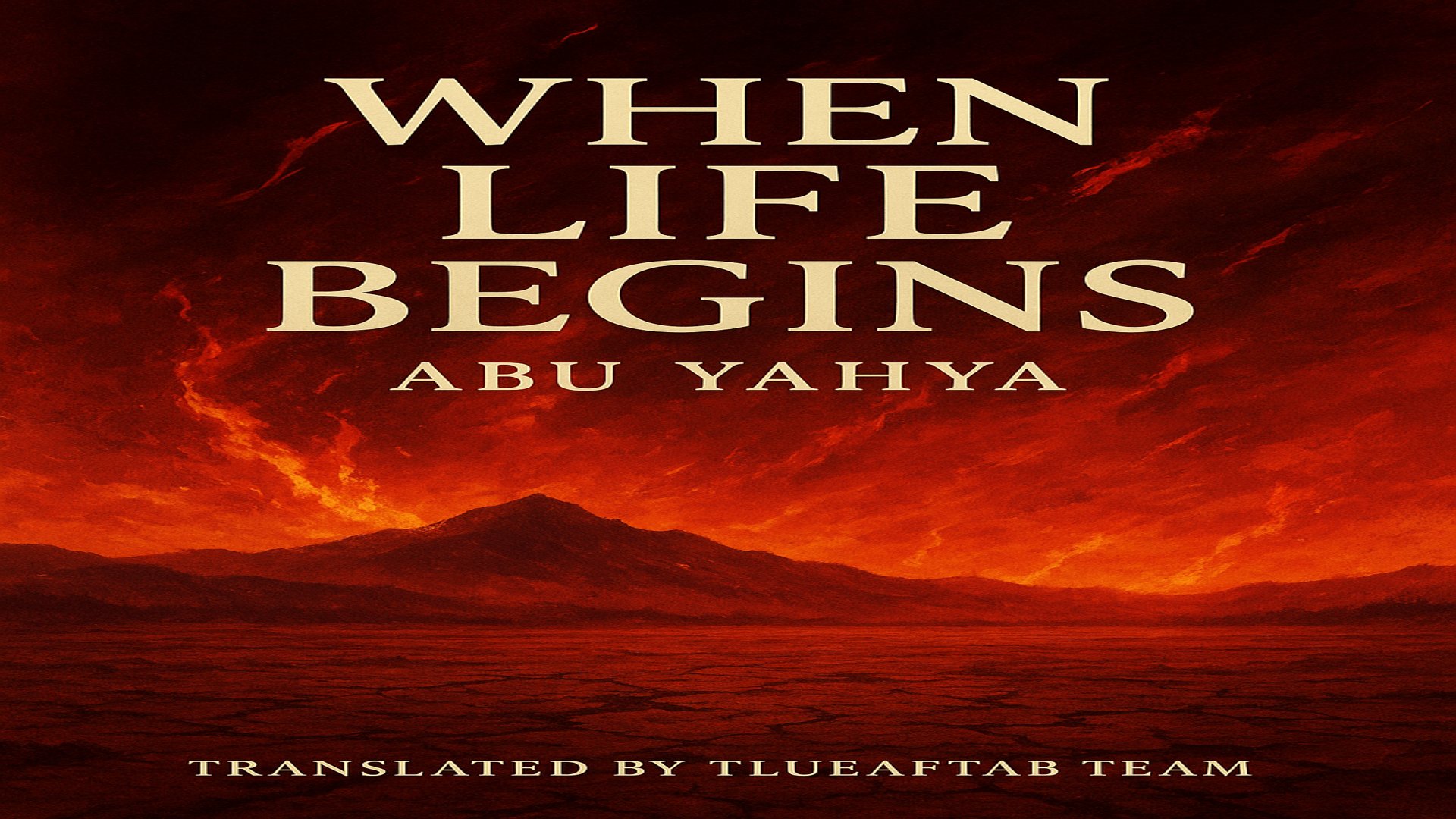Abu Yahya (Translated By Tlueaftab Team)
As we drew closer, Asma’s eyes fell on me. She nudged Laila, who slowly lifted her head from her knees. Our eyes met, and in her gaze there was such helplessness, terror, and sorrow that my heart felt torn apart. She stood up, ran toward me, clung tightly, and began weeping bitterly. From her lips came nothing but the cry, “Abu! Abu!”
It was extremely difficult for me to restrain myself. I felt that if she continued crying like this, my own dam of self-control would burst. Stroking her head, I said softly, “My child, be quiet. Did I not always tell you—learn to live for this Day? This world was nothing but a deception.”
“Yes, you were right, Abu… but my eyes were veiled,” she sobbed even harder, pressing herself against my chest.
Before my eyes flashed scenes from her entire life—her birth, her childhood, her youth, her every stage. Once, she was a little doll on a bed whose cries made me restless. Once, a fairy in her frock, for whose every gesture I would give my life. Then, a young schoolgirl in uniform with a bag slung over her shoulder, and later, a college student like a budding flower. Then, a bride in her wedding dress—my own heart’s fragment—now reduced to a picture of despair, clinging to me in grief.
It felt as if my heart would burst. I pulled her away with my arms and held my head in both hands, standing still.
In a trembling voice Laila said, “I have not found any of my family here—not my husband, not my children. No one from among our relatives… except my brother. He is in a terrible condition. Abu, he is desperately searching for you. He has hope only in you.”
Looking at her, I replied, “That fool had pinned wrong hopes in the world, and now he has done the same here. In the world, he placed all his trust in his business, his wife, and children. Today, he is reaping the result. And now he thinks I can help him? But I can do nothing.”
By then, Asma too had come close. Hearing my last words, she said, “Uncle, I had placed all my hopes in you… and now you too are disappointing me.”
I said, “Do you remember, Asma, the first time you came to my house with Laila? Do you recall what I told you?”
Before Asma could reply, Laila answered in her place, weeping, “Yes Abu, I remember. You told her, ‘My child, you are my daughter’s friend. Be such a friend that you remain with her even in Paradise. Do not make God angry, lest you both end up together in some terrible place. Do not let the Day of Judgment come when you both blame each other, saying it was this friendship that destroyed me.’”
As she said this last sentence, Laila broke down in sobs again, and Asma too began weeping with her.
I turned my head to look at Saleh, who had been silently standing all this while. I hoped perhaps he would say something consoling. Sensing my gaze, Saleh began speaking:
“Abdullah, remember this: Every person’s matter rests only in the hands of Allah. Not even a deed the weight of a mustard seed will be missing from the record. Every act will be judged here—intentions, causes, circumstances, deeds, and their outcomes, all will be weighed. Angels, walls, body parts—everything will testify until it becomes absolutely clear what reward or punishment each deed deserves.
A good deed will be rewarded ten to seven hundred times over. Acts of patience and service for the religion will be rewarded without measure. But sins will be punished only equal to their weight. However, crimes such as shirk, murder, and fornication—if they are in the record—will destroy a person. And consuming the wealth of orphans, usurping inheritance, slander, and such crimes are so dangerous they can devour all good deeds and still drag a person into Hell. These are the general rules of justice. On their basis, Allah will judge with absolute fairness. Rest assured—not even the weight of a mustard seed of injustice will be done.
The only hopeful thing regarding your children—the point I told you earlier—is that apart from the foremost believers, all true believers will eventually be saved through this process of reckoning, sooner or later. But you know your children better than me—you know what chances of salvation they may have.”
I sighed and replied, “I am most worried about my son. He loved money, cars, houses, and becoming wealthy. That desire alone can lead a man to ruin. For once it takes hold, a person loses the sense of lawful and unlawful, right and wrong. Even if he avoids unlawful earnings, extravagance, negligence, showing off, miserliness, arrogance, and violating others’ rights—all these vices bring him into this Court of Divine Justice, where salvation becomes very difficult.”
Unexpectedly, Asma spoke up, “Laila often told me these things. She even gave me some of your books to read. But I could not read Urdu. That was my misfortune. My whole life was spent in heedlessness, worldliness, fashion, showing off, extravagance, and arrogance. I was obsessed with looking beautiful. I wasted millions on jewelry, clothes, and cosmetics, but could never spend on the poor. And even when I did, I considered it a huge favor. Though Allah had given us so much wealth, I never used it rightly.
Not only that—whenever I became angry, I would vent it mercilessly on the weak. For me, modest dress was a sign of poverty. Backbiting, slander, fault-finding—these were just petty things in my eyes. I never realized that these ‘small things’ could become such a great calamity today… I never knew.”
Saying this, she broke down in uncontrollable tears once again.
Laila, in a sorrowful tone, added, “Her parents were in a very bad condition when we saw them. God knows what will happen to them. Abu… what will happen to me?”
Tears flowed from her eyes as she said this.
“My child, wait a little longer. Soon the reckoning will begin. I hope in Allah’s mercy that after enduring such hardships, He will forgive those sins you thought trivial in the world.”
“Alas Abu! If only I had chosen your path! You told me many times that faith is not just about reciting the Kalimah with the tongue—it is about making God’s presence the very essence of your life. Formal worship is not what He seeks. He wants a heart filled with sincerity. He does not need lifeless prostrations—He wants a true, God-fearing servant. I did pray, Abu, because you told me to. But remembrance of God never became my life. I did fast, but true piety never grew in me.
Had I followed your path, it was at most fifty years I would have had to live like that. But now, centuries have passed in this torment and heat…”
Hearing this, Asma placed her hand on Laila’s shoulder and said through sobs, “Sister, you are still better than me. At least you prayed and fasted. I did nothing. Add to that my arrogance, extravagance, showing off, and violation of others’ rights. What will become of me? I see no end for myself but Hell!”
She cried out in anguish, screaming uncontrollably. Their words were tearing my heart apart. I could no longer bear to stay with them.
Sensing my condition, Saleh addressed the two girls: “Abdullah must leave now. You two remain here and await Allah’s decision. Soon the reckoning will begin.”
He took my hand and led me forward. I wanted to console Laila one last time, but when I turned back, the scene had completely changed—we were in another place.
“I had to move you quickly, otherwise you would have suffered more,” Saleh said. Then he asked, “Do you wish to meet your son now?”
“No,” I replied firmly. “I cannot bear to see anything more.”
My heart was drowning in an ocean of sorrow. If only I could return to the world and make Laila’s reformation my life’s greatest mission. But I realized that was now impossible. A poisonous snake of doubt lifted its head within me, and I asked Saleh, “Tell me… is Laila’s condition somehow my fault? Am I responsible for her state?”
“No, not at all,” Saleh replied. “Even the son of Prophet Noah (AS) went astray. But Noah was not responsible. Man’s duty is only to convey the truth. Accepting or rejecting it is always the decision of others. Your daughter Laila made her own choices. You are not to blame for her suffering.”
Hearing this, I felt a great burden lift from my heart. But the next moment a terrifying thought struck me: What if I am held accountable for her on any grounds?
And then a dreadful realization dawned: On this Day, without hesitation, I would cast even my beloved daughter into Hell if it meant saving myself. Such is the severity of this Day, before which every relationship and bond becomes meaningless.
The atmosphere of the Resurrection was unbearably harsh. On one side was the physical torment of heat and exhaustion; on the other, the haunting fear of what lay ahead. Along with despair and misery, people were also consumed with anger—at themselves, and at their leaders who had misguided them.
Whenever a leader fell into the hands of his followers, they would mercilessly beat him. This was a kind of torment before the real torment. Everywhere in the plain, such scenes were unfolding—disciples beating their so-called spiritual guides, devotees thrashing their so-called saints, followers attacking their scholars and rulers. But what was the use now? Still, these spectacles offered some distraction to the grief-stricken crowds.
As we passed such scenes, I said to Saleh, “It amazes me. In the world, just a few hours of power outage and summer heat would leave us miserable. But here, ages have passed and people are still stuck in this torment. Because of your company, I don’t feel the suffering at all. But those without it—how terrible their condition must be!”
“Correct your words,” Saleh said firmly. “This is not terrible—it is justice. Yes, the matter is severe. That is why the heavens, the earth, the mountains—all refused to carry this Trust of free will. Only man accepted it, along with the responsibility of judgment and consequence.”
I pondered deeply. “If the trial is this severe for ordinary people, then what about those who carried authority over entire nations—oppressive rulers, corrupt officials?”
“Do you wish to see what happens to them?” Saleh asked.
I nodded.
Walking in one direction, he explained, “Until now we were only in the area of those awaiting reckoning. Just as the foremost believers are already under the Throne, enjoying God’s favors, with no reckoning for them—only an announcement of success—similarly, there are some wretches whose crimes are so great that their fate has already been decided: Hell. We are now going toward them.”
The further we went, the more intense the heat grew. I noticed it in the sweat pouring from people’s bodies—not in drops, but in streams. Yet the ground was so hot that the sweat was instantly absorbed. People’s lips were cracked, their mouths gaping like parched camels, but there was no question of water.
On their faces was not just misery, but the shadow of dread. And soon, the reason became clear. Suddenly, there was commotion in the crowd. People began running in all directions. When the crowd parted, I saw a man being chased by two angels. One held a whip of fire, the other a whip studded with iron nails.
The man tried desperately to escape, but the angels pursued him relentlessly. They seemed to be deliberately tiring him out. When they caught up, they struck him with their whips, shouting: “O ruler! Stand and march toward your kingdom!”
Each lash made him scream, fall, and stumble before running again, only to be beaten further.
I did not have to wait long for his identity. Saleh said, “This is the head of state of your country.”
Soon, the ruler collapsed under the torment of fiery and nail-studded lashes. The angels then began binding him in a long chain whose links were heated red in fire. He writhed helplessly, begging for mercy—but the angels knew no such thing as mercy. They chained his entire body mercilessly.
Just then, more angels arrived. The first ones said to them, “We have seized the head of state. Now go and capture all his courtiers, ministers, flatterers, and companions—those who aided him in his tyranny and corruption.”
Instantly, chaos erupted in the crowd again. In no time, a vast group was captured—ministers, nobles, advisers, bureaucrats, landlords, feudal lords, capitalists, and every kind of oppressor.
The angels then dragged them all by their hair, forcing their faces against the ground. As they passed by us, the stench of their burning flesh spread through the air. Feeling faint, I only revived when Saleh placed his hand on my back. The angels pulled them further along, leaving behind bloodstains and marks on the ground from their bodies being dragged…
📜✍🏻 To be continued…




